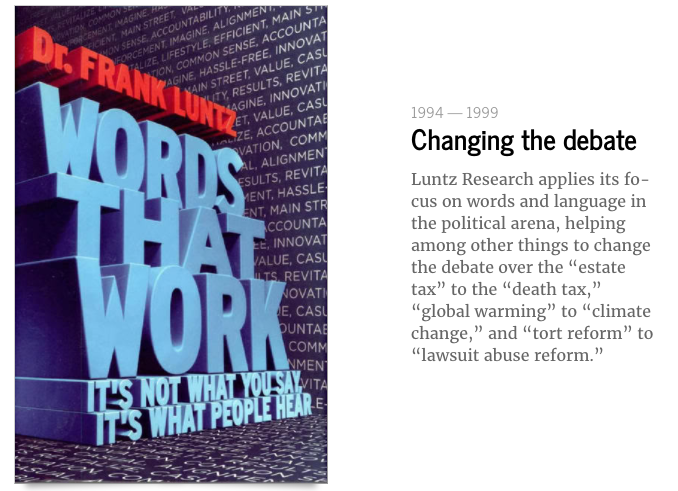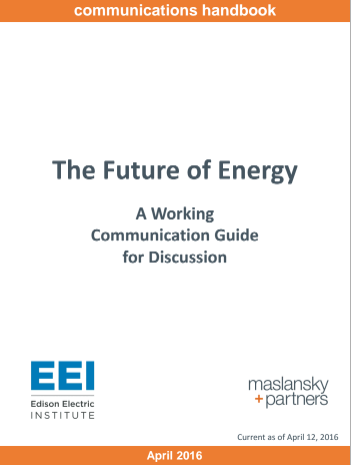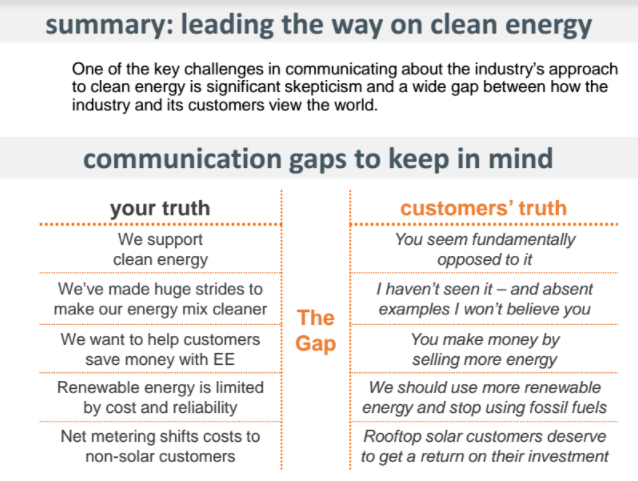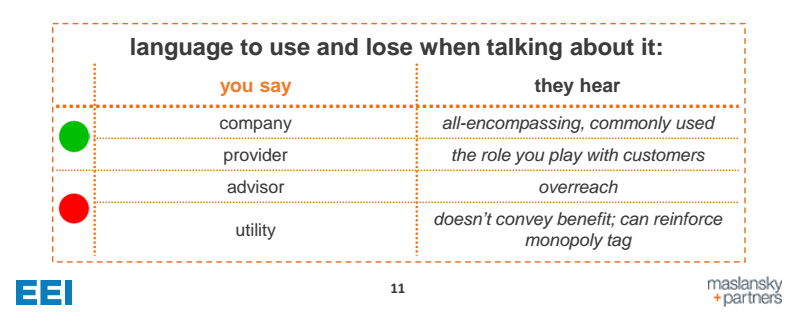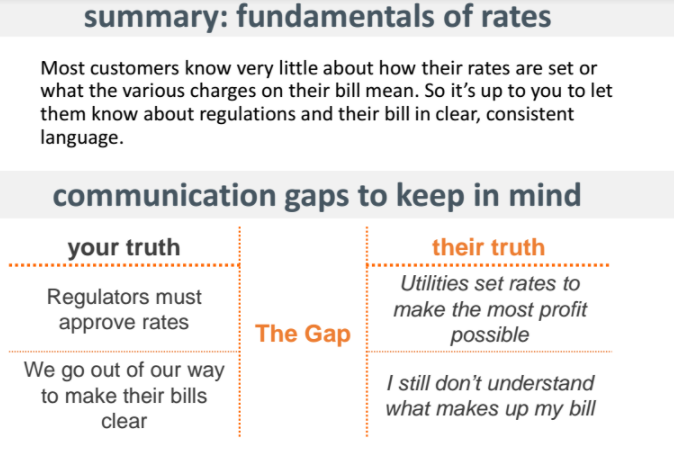In 2016, documents published by the Huffington Post first exposed what would soon become known as the Lexicon Project, a plan by the Edison Electric Institute (EEI) to pay the public relations firm Maslansky + Partners to repair the utility industry’s’ sullied public image following years of unpopular attacks on rooftop solar and environmental safeguards.
The result: a “communications handbook” designed to fool utility customers and regulators, published here in its entirety for the first time.
Utilities faced a public relations crisis
The lack of public trust that the utility industry faced when EEI hired Maslansky + Partners is laid bare in the handbook, which based its recommendations on “extensive lexicon research” that was “national in scale” and used “a mix of emotion-based qualitative and statistically significant quantitative measures”:
In the solar battleground state of Florida, a March 2016 poll found that only around 4 percent of Floridians viewed utilities as trustworthy sources of information on climate change and the environment.
Reframing rooftop solar as private solar
Maslansky + Partners also recommended that utilities replace the popular term “rooftop solar” with “private solar”:
Similarly, the Lexicon Project advised that “net metering” should be reframed as “private solar credits,” according to the handbook.

Polls show that Americans of all political stripes favor rooftop solar. A majority of Americans also support net metering incentives that provide utility customers who go solar with “full retail rate credits for the extra energy their rooftop solar panels produce,” which presents a real challenge to EEI and its utility-backed campaign to disincentivize rooftop solar by slashing net metering payments and raising fixed charges on solar customers.
The messaging that Maslansky + Partners developed for utilities changed over the course of the Lexicon Project. The firm initially recommended utilities reframe “distributed generation” as “local generation,” but later upped the ante to “private generation.”
Don’t say “utility”
Maslansky + Partners even told utilities to “lose” the term “utility” itself, because “it doesn’t convey benefit; can reinforce monopoly tag”:
More language for utilities to lose
Maslansky & Partners also advised EEI that “clean coal” and “safe nuclear” are “not credible” terms for utility customers:
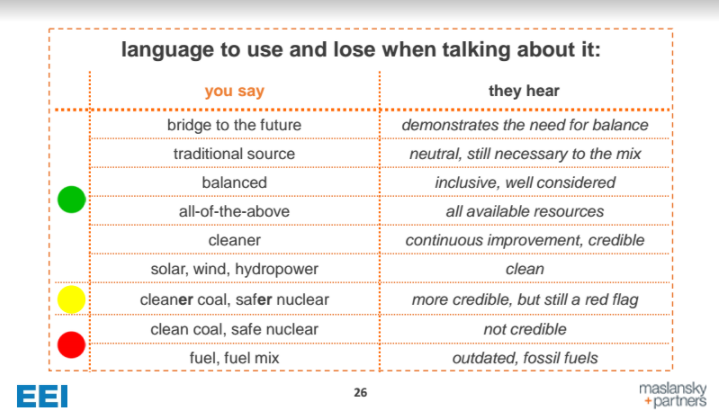
However, EEI continues to use the term “clean coal” in its own messaging. In fact, a 2017 press release from EEI congratulating Scott Pruitt for his confirmation as Donald Trump’s Environmental Protection Agency administrator used the “clean coal” phrase. Pruitt’s confirmation took place just days before the court-ordered release of thousands of emails that confirmed his close ties to the fossil fuel and utility industries as Oklahoma attorney general. Leading members of EEI, such as American Electric Power and Southern Company, also remain members of the American Coalition for Clean Coal Electricity, though other utilities have left the controversial front group.
The Lexicon Project handbook further recommended that utilities try to use the term “‘traditional’ energy sources” and “don’t directly call out cleaner coal, natural gas, or safer nuclear” when discussing clean energy:
But documents obtained by UtilitySecrets.org revealed plans by EEI to use the term “low carbon future” to greenwash the utility industry’s risky rush to natural gas, which represents a missed opportunity to invest more in truly clean energy resources, such as renewable energy and energy efficiency.
EEI presented its communications handbook to regulators who oversee utility rate cases
Maslanky + Partners research confirmed that utilities and their customers don’t see eye to eye on who controls electricity rates.
The handbook suggested that utilities “win” when customers are told “that independent regulators, who represent customer interests, must approve all rate changes” proposed by utilities:
In November 2016, EEI presented the Lexicon Project to some of these “independent” regulators. Emails obtained via a public information request show that the utility trade group presented a slideshow version of the Maslansky + Partners communications handbook to the National Association of Regulatory Utility Commissioners (NARUC) Executive Committee just days before NARUC’s 2016 annual meeting in La Quinta, California:
At the time, members of NARUC’s Executive Committee included:
- Travis Kavulla: president of NARUC, Montana Public Service Commission
- Robert Powelson: first vice president of NARUC, Pennsylvania Public Utilities Commission
- John Betkoski, III: second vice president of NARUC, Connecticut Public Utilities Regulatory Authority
- David E. Ziegner: treasurer of NARUC, Indiana Utility Regulatory Commission
- Greg R. White: executive director of NARUC
The presentation to NARUC’s Executive Committee included slides summarizing EEI’s plan for “resetting the terms of the discussion”:
Armed with their disinformation handbook, utilities are back on the attack
Thomas Fanning, the CEO of Southern Company and chairman of EEI, hailed the Lexicon Project as enabling utilities to resume an “offensive posture” on energy policy. Communications staff for utility companies American Electric Power (AEP), Florida Power & Light (FPL), and PG&E were all involved in the production of EEI’s new messaging playbook.
One goal of EEI’s communications strategy is to “secure positive policy outcomes” for utilities, as Brian Wolff, the group’s executive vice president for public affairs, explained during a 2017 Wall Street briefing. Wolff’s presentation stated that the Lexicon Project would be used for “engagement” with “State commissioners” and “consumer advocates,” among other stakeholders. Wolff also referenced “50 briefings” and “100s of examples of language in use” in his presentation.
UtilitySecrets.org has identified a number of examples of how EEI’s member utilities have already put the Lexicon Project playbook into action as part of their attacks on rooftop solar:
- Eric Silagy, the CEO of FPL, used the term “private solar” to defend the rollback of Florida’s solar rebate program, and to support an anti-rooftop solar amendment to the state’s constitution that voters ultimately rejected at the ballot box in November of 2016
- Phillip Moeller, Senior Vice President of Energy Delivery for EEI, claimed at a Federal Trade Commission (FTC) workshop that net metering, “has non-private solar rooftop people subsidizing those who own rooftop.” Comments delivered to the FTC by EEI similarly used the term “private solar” to attack net metering
- AEP staked out a position that “large-scale universal solar is a better alternative to private solar.”
- Arizona Public Service claims on its website that, “Recent studies have shown that universal solar is more cost-effective and provides more environmental benefits than private solar.”
“Universal solar” is another term Maslansky + Partners developed to replace “utility-scale solar,” a phrase utility customers viewed negatively (and correctly) as implying utility-control over solar. Utilities are now using their investments in large-scale solar projects to blunt criticism of their efforts to undermine the growing competition from rooftop solar. In reality, rooftop and utility-scale solar are both smart investments that can grow together, and the investments in utility-scale solar have been small compared to utilities rush to over-reliance on natural gas.
EEI hired an experienced spinmaster to develop the Lexicon Project
In his 2011 book, “The Language of Trust: Selling Ideas in a World of Skeptics,” Michael Maslansky boasted of his work to help “a major electric utility” sell its customers on an unpopular rate hike. He also recommended confronting utility customers with threats of “higher electricity rates” and “rolling blackouts” as a way to counter their enthusiasm for wind and solar power.
On its website, Maslanksy + Partners still highlights its earlier work, when spinmaster Frank Luntz was at the helm of the company, to “change the debate” on global warming. Then operating under the name Frank Luntz Research Associates, the firm published a now infamous memo advising Republican politicians on how to frame their misleading attacks on climate change science and solutions in order to fool the public.
